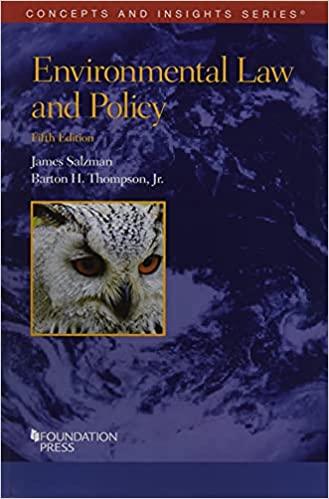Question
reference: Basic bankruptcy law for paralegals David Buchbinder 11th edition Among the Trustee's duties are: Group of answer choices a. Accounting for all property received.
reference: Basic bankruptcy law for paralegals
David Buchbinder
11th edition
Among the Trustee's duties are: Group of answer choices
a. Accounting for all property received.
b. Disbursing money.
c. Filing a final report and accounting.
d. All of the above.
Operating reports are: Group of answer choices
a. A form of disclosure statement requiring approval by the bankruptcy court before the proponent of a plan may solicit creditor acceptance.
b. A history of how the debtor became insolvent.
c. Reports of receipts and disbursements in a Chapter 11 case after the petition is filed.
d. Noncumulative income and expense statements showing the financial condition of the debtor at the time the bankruptcy petition is filed.
A small business debtor: Group of answer choices
a. Can only be a sole proprietor.
b. Is a debtor with debts of less than $5 million and who can pay all creditors in full.
c. May not file a Chapter 11 bankruptcy case.
d. Is a business debtor with debts of less than $2,725,625.
In a Chapter 11 case, the debtor-in-possession: Group of answer choices
a. is authorized to continue to operate the debtor's business without court approval.
b. must cease all operations at the time the petition is filed.
c. must surrender all property to the trustee when the petition is filed.
d. need not close existing business bank accounts and open new ones.
A Chapter 7 Trustee may operate the debtor's business: Group of answer choices
a. For a limited period of time with court approval.
b. When the case is converted to a Chapter 13.
c. Will never operate a debtor's business.
d. Until the case is closed.
A health care ombudsman is appointed to: Group of answer choices
a. make sure patients pay their bills;
b. ensure that insurance claims are paid to the estate;
c. dispose of patient records in a closing health care facility
d. represent the interests of the patients.
After selection, a bankruptcy interim trustee qualifies by: Group of answer choices
a. Appearing at the meeting of creditors.
b. Residing in the district where selected.
c. Posting a bond in the amount set by the United States Trustee within 7 days of selection.
d. None of the above.
In a Chapter 7 case: Group of answer choices
a. The interim trustee can be removed in favor of another trustee by vote of the creditors at the meeting of creditors.
b. The interim trustee will become the trustee if the Bankruptcy Court has appointed him or her as trustee.
c. The debtor-in-possession is trustee.
d. The U.S. Trustee will be the trustee in all cases.
A Chapter 13 plan: Group of answer choices
a. Must provide for payment of all debts in full or it is not proposed in good faith.
b. May not cure a default in payment of a home mortgage where the lender (secured creditor home mortgagee) has accelerated payment of the loan due date because of default.
c. Requires payment of all delinquencies owing to secured creditors in full at confirmation.
d. Must provide for the submission to the trustee of necessary future income of the debtor to make payments under the plan.
In a Chapter 13 case, unlike a Chapter 11 case: Group of answer choices
a. Only the trustee can propose a plan.
b. The debtor may not continue to operate the business.
c. The corporate shareholders of the debtor may not get paid under the plan.
d. A trustee is always appointed.
Any party in interest may file a Chapter 13 plan for the debtor if the debtor does not file a plan within the first 100 days. Group of answer choices
True
False
The Chapter 13 debtor does not have to begin making payments to the trustee until his/her plan is confirmed by the court. Group of answer choices
True
False
A debtor whose median family income is less than the applicable state median family income must always propose a Chapter 13 plan that is not less than five years in duration unless unsecured claims can be paid in full in less time. Group of answer choices
True
False
In a Chapter 13, property of the estate includes: Group of answer choices
a. Pre-petition exempt property.
b. Post-Petition earnings of the debtor.
c. None of the above.
d. All of the above.
A bankruptcy trustee may invest cash of the estate: Group of answer choices
a. In a savings account or certificate of deposit only.
b. However she wants.
c. In trust deeds, mutual funds, savings accounts or certificates of deposit.
d. In a manner best designed to increase the estate while minimizing the risk of loss to the creditors.
Which of the following clause or clauses in a lease is/are unenforceable against a trustee in a bankruptcy case: Group of answer choices
a. A termination clause conditioned on the insolvency of a tenant.
b. A termination clause conditioned on the tenant's change in the designated use of the property.
c. A clause in a lease prohibiting a Chapter 7 and 11 trustee from damaging the premises.
d. All of the above.
Are there any other grounds under the Bankruptcy Code to seek discharge of a student loan? No. (Prior to October of 1998, a student loan could be discharged if it was more than seven years old, but this provision was removed from the Bankruptcy Code.) (+2 points)
Step by Step Solution
There are 3 Steps involved in it
Step: 1

Get Instant Access to Expert-Tailored Solutions
See step-by-step solutions with expert insights and AI powered tools for academic success
Step: 2

Step: 3

Ace Your Homework with AI
Get the answers you need in no time with our AI-driven, step-by-step assistance
Get Started


